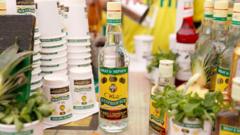The essence of Jamaican rum is under scrutiny amid a legal dispute over geographical indications (GI). This article delves into the implications for local producers, affected stakeholders, and the broader Caribbean rum industry.**
Jamaican Rum Dispute: The Battle Over Geographical Indications**

Jamaican Rum Dispute: The Battle Over Geographical Indications**
The ongoing debate about what constitutes "Jamaica Rum" highlights the clash between local authenticity and international business models.**
Rum is a cornerstone of Jamaica's cultural heritage and economy, yet a contentious debate surrounding its identity has emerged on the island. Central to this dispute is the clarification of what defines “Jamaica Rum,” a conversation that has intensified due to recent amendments by Jamaica's Intellectual Property Office (JIPO). The revisions to the geographical indication (GI) criteria prohibit the aging of Jamaican rum outside the island—a change that some producers believe will strengthen the rum’s authenticity and international recognition.
In October of the previous year, JIPO endorsed these amendments in response to pleas from the Spirits Pool Association (SPA), representing Jamaica's six primary rum distilleries. The association argues that tightening GI regulations is crucial for differentiating Jamaica’s rum in major export markets like the EU and the US, thereby enhancing its recognition as a high-quality spirit crafted in its native land.
However, the amendments sparked controversy, particularly with one significant player in the market: National Rums of Jamaica (NRJ), which controls Long Pond and 73% of Clarendon Rum. The company, owned by a consortium comprising the Jamaican government, Demerara Distillers of Guyana, and Barbados-based West Indies Rum Distillery (WIRD), contends that rum can still be regarded as Jamaican even if aged abroad. NRJ claims that the aging process has been a longstanding practice that should not affect the rum's identity.
NRJ is challenging JIPO's decision, with a court hearing scheduled for April 28. The dispute hinges on whether rum produced on Jamaican soil but subsequently aged overseas qualifies as “Jamaica Rum.” Christopher Gentles, SPA's general manager, expressed skepticism about NRJ's position, asserting that true Jamaica Rum should undergo its aging process on the island to preserve its unique characteristics.
Further complicating matters, the SPA highlights the economic drawbacks of shipping rum overseas for aging, including the loss of local benefits related to refining, bottling, and tourism. According to Dev Gangjee, a professor of intellectual property law, geographical indications can generate a price premium, preserve regional production, and significantly boost local economies through tourism and brand awareness.
The GI debate is not limited to Jamaica; neighboring Barbados finds itself in a similar conflict. The island has also been unable to establish a GI scheme due to concerns from WIRD, which opposes rules barring the overseas aging of rum. Local distillers, eager for recognition and protection of their products, are frustrated by the lack of progress in asserting Barbados Rum's authenticity.
In Jamaica, the SPA is keen on applying for the EU's Protected Geographical Indication classification, but further action hinges on the outcome of legal disputes with NRJ. Despite the friction, Gentles anticipates a potential resolution and recognizes the importance of preserving Jamaica’s rum legacy. Echoing this sentiment, The Gleaner newspaper underscored the necessity of protecting the island's brand integrity against foreign appropriation, emphasizing the deep historical connections between Jamaica and its rum industry.



